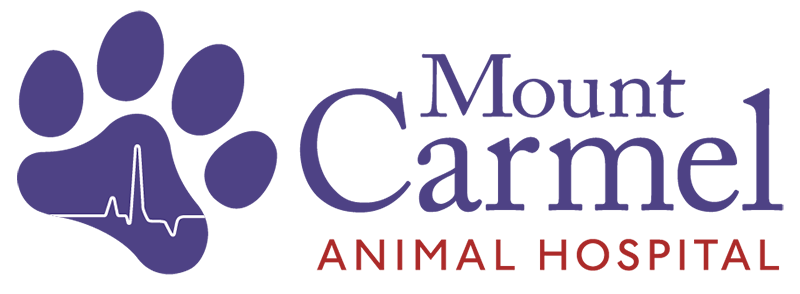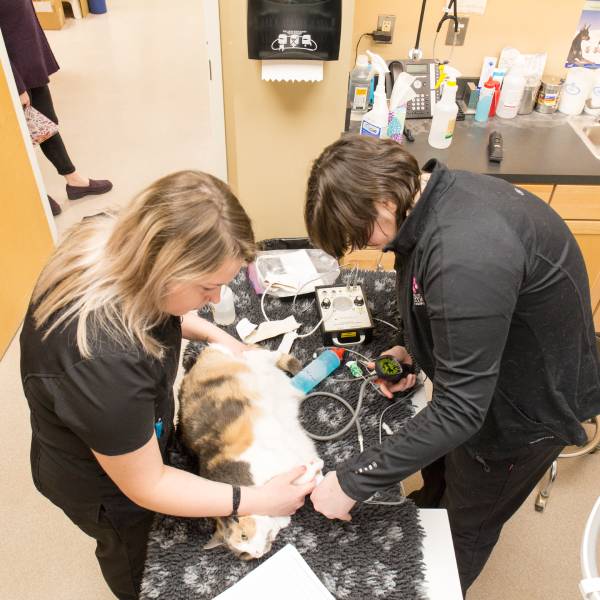Cardiac Care
Just like us, dogs and cats can experience a variety of heart problems, ranging from congenital (present at birth) to acquired (developed over time). While some heart conditions (like mild murmurs) require minimal treatment, others (like congestive heart failure) need lifelong management. Early diagnosis and treatment significantly improve quality of life. Regular veterinary care is the key to early detection and intervention.
Signs of Heart Disease in Dogs & Cats
- Persistent coughing (more common in dogs)
- Difficulty breathing or rapid breathing
- Fatigue, weakness, or reluctance to exercise
- Fainting or collapse
- Swollen abdomen (fluid buildup)
- Loss of appetite or weight loss
- Cold limbs or sudden hind leg paralysis (cats, FATE)
Early diagnosis and treatment can help manage heart conditions. If your pet is showing any symptoms, an office visit today.
Common cardiac conditions in pets:
Heart Diseases in Dogs
- Mitral Valve Disease (MVD)
- Most common heart disease in small-breed dogs (e.g., Cavalier King Charles Spaniels).
- A degenerative condition where the mitral valve leaks, causing heart enlargement and eventual heart failure.
- Dilated Cardiomyopathy (DCM)
- More common in large and giant breeds (e.g., Dobermans, Boxers, Great Danes).
- The heart muscle weakens, causing poor contraction and leading to heart failure.
- Some cases are linked to diet, specifically grain-free diets low in taurine.
- Congestive Heart Failure (CHF)
- Can result from MVD or DCM.
- The heart cannot pump effectively, leading to fluid buildup in the lungs or abdomen.
- Symptoms: coughing, difficulty breathing, lethargy, swollen belly.
- Arrhythmias (Irregular Heartbeat)
- Electrical disturbances in the heart cause an abnormal rhythm.
- Some breeds (e.g., Boxers) are predisposed to life-threatening arrhythmias.
- Congenital Heart Defects
- Present from birth, such as:
- Patent Ductus Arteriosus (PDA) – A vessel that should close after birth remains open, affecting circulation.
- Aortic or Pulmonic Stenosis – Narrowing of heart valves leading to restricted blood flow.
- Present from birth, such as:
Heart Diseases in Cats
- Hypertrophic Cardiomyopathy (HCM)
- The most common heart disease in cats.
- Thickening of the heart muscle reduces efficiency and can lead to blood clots (thromboembolism) or sudden death.
- Common in Maine Coons, Ragdolls, and other breeds.
- Feline Arterial Thromboembolism (FATE) / Saddle Thrombus
- A serious complication of HCM where a blood clot forms in the heart and blocks blood flow to the hind legs.
- Causes sudden paralysis and severe pain.
- Congestive Heart Failure (CHF)
- Like in dogs, CHF in cats leads to fluid buildup in the lungs or chest.
- Signs: open-mouth breathing, lethargy, hiding, difficulty moving.
- Congenital Heart Defects
- Less common in cats but can include PDA, septal defects (holes in the heart), or valve abnormalities..
Diagnosing Cardiac Disease in Pets
Cardiac diseases in dogs and cats are diagnosed using a combination of physical examination, imaging, and specialized tests. Common diagnostic methods:
Physical Examination & History
- The vet listens to the heart with a stethoscope to check for murmurs, irregular rhythms, or abnormal sounds.
- They ask about symptoms like coughing, lethargy, difficulty breathing, or fainting.
Diagnostic Tests – Available at MCAH
- Chest X-Rays (Radiographs)
- Show heart size and shape.
- Detect fluid buildup in the lungs (a sign of congestive heart failure).
- Useful for evaluating pulmonary (lung) health related to heart disease.
- Echocardiogram (Heart Ultrasound)
- The most accurate test for diagnosing heart disease.
- Assesses heart chamber size, valve function, and muscle thickness.
- Detects diseases like mitral valve disease, dilated cardiomyopathy (DCM), and hypertrophic cardiomyopathy (HCM).
- Performed in-house at MCAH by Dr. Paul Fox and submitted through telemedicine to a veterinary cardiologist for review.
- Electrocardiogram (ECG or EKG)
- Records the heart’s electrical activity to diagnose arrhythmias (irregular heartbeats).
- Used if pets have fainting episodes or an abnormal heartbeat.
- Blood Tests (Including Biomarkers)
- NT-proBNP & Troponin Tests: Measure heart-related proteins to detect heart disease early.
- General blood tests check for kidney and liver function, which can be affected by heart disease.
- Blood Pressure Measurement
- High blood pressure (hypertension) can contribute to heart and kidney disease, especially in cats.
- Holter Monitor (24-Hour ECG Monitoring)
- A wearable ECG device used for long-term heart rhythm monitoring.
- Often used in breeds prone to arrhythmias (e.g., Boxers, Dobermans).
Next Steps After Diagnosis
If heart disease is diagnosed, treatment may include medications, dietary changes, lifestyle adjustments, and sometimes surgery or pacemakers. Regular office visits help monitor your pet’s condition over time.
Treatment for Heart Disease in Dogs and Cats
Treatment for cardiac disease in dogs and cats depends on the specific condition, severity, and symptoms. While many heart diseases are not curable, they can often be managed with medications, lifestyle changes, and sometimes surgical interventions. Main treatment options:
Medications
- Pimobendan (Vetmedin) – Strengthens Heart Contractions
- Used for mitral valve disease (MVD) and dilated cardiomyopathy (DCM).
- Helps improve blood circulation and delay heart failure progression.
- Often used before clinical signs of congestive heart failure (CHF).
- Has been shown to slow the progression of heart disease.
- ACE Inhibitors (Improve Heart Function & Blood Flow)
- Enalapril, Benazepril, Ramipril
- Helps lower blood pressure and reduce strain on the heart.
- Diuretics (Reduce Fluid Buildup)
- Furosemide (Lasix), Torasemide, Spironolactone
- Helps remove excess fluid from the lungs or abdomen in cases of congestive heart failure (CHF).
- Beta-Blockers & Calcium Channel Blockers (Control Heart Rate & Rhythm)
- Atenolol, Propranolol, Diltiazem
- Used in cats with hypertrophic cardiomyopathy (HCM) to slow heart rate.
- Helps manage arrhythmias (irregular heartbeats) in dogs and cats.
- Anti-Arrhythmic Drugs (Control Irregular Heartbeats)
- Sotalol, Mexiletine, Amiodarone
- Used for pets with life-threatening arrhythmias like those seen in Boxers and Dobermans.
- Blood Thinners (Prevent Clots in Cats with HCM)
- Clopidogrel (Plavix), Aspirin, Heparin
- Reduces risk of saddle thrombus (FATE), a life-threatening blood clot in cats.
Dietary & Lifestyle Management
- Low-Sodium Diet: Reduces fluid buildup and helps heart function.
- Taurine & L-Carnitine Supplements: May help certain heart diseases (especially in DCM which can be caused by certain grain-free diets).
- Omega-3 Fatty Acids: Support heart health and reduce inflammation.
- Weight Management: Obesity worsens heart disease; maintaining a healthy weight is crucial.
- Exercise Restriction: Dogs with severe heart disease should avoid overexertion.
Regular Monitoring & Check-Ups
- Echocardiograms & X-rays: Track disease progression.
- Bloodwork: Monitors kidney and liver function while on heart medications.
- Holter Monitoring: For pets with arrhythmias to assess heart rhythm over 24 hours.
Advanced Treatments & Surgical Options
- Pacemakers (For Severe Arrhythmias)
- Used in dogs with third-degree heart block or other life-threatening arrhythmias.
- Balloon Valvuloplasty (For Stenosis)
- A minimally invasive procedure to widen a narrowed heart valve (common in young dogs with pulmonic or aortic stenosis A minimally invasive procedure to widen a narrowed heart valve (common in young dogs with pulmonic or aortic).
- Mitral Valve Surgery (Rare but Available in Some Cases)
- Some specialized veterinary centers offer mitral valve repair or replacement for dogs with severe MVD.
Prognosis & Long-Term Care
While some heart conditions (like mild murmurs) require minimal treatment, others (like congestive heart failure) need lifelong management. Early diagnosis and treatment significantly improve quality of life.
About Echocardiograms
Echocardiograms are a type of ultrasound for the heart, and a very important diagnostic tool when a cardiac work up is recommended. This test enables us to evaluate heart function, structure, and blood flow in real-time.
Echocardiograms may be recommended when:
- Detecting heart murmurs or abnormal heart sounds
- Diagnosing heart disease (like dilated or hypertrophic cardiomyopathy)
- Checking for fluid around the heart (pericardial effusion)
- Evaluating valve function and blood flow
- Monitoring congenital heart defects (especially in young pets)
- Assessing the heart before surgery or treatment
What to Expect if your pet has echocardiogram
- It is non-invasive and painless
- May require shaving the chest for clear imaging
- Most pets don’t need sedation unless they’re very anxious
Echocardiograms are performed in-house at Mount Carmel Animal Hospital by Dr. Paul Fox. All studies are submitted through telemedicine to a cardiologist for review.
About Electrocardiograms (ECG or EKG)
An electrocardiogram is a simple, painless test that records the heart’s electrical activity. With each heartbeat, electrical signals are sent through the heart, causing the heart to contract and pump blood.
The electrical signals set the rhythm of the heartbeat. The ECG test detects abnormal heart beats (arrhythmias) which can cause weakness, fainting, or lethargy.
Electrocardiograms may be recommended if your pet:
- Has a heart murmur or irregular heartbeat
- Shows signs of fainting, weakness, or collapse
- Has rapid or slow heart rates
- Needs heart monitoring before surgery or anesthesia
- Is diagnosed with heart disease
What to Expect if your pet has an electrocardiogram:
- Small pads (electrodes) are placed on the pet’s skin (often on the legs and chest).
- The test is quick, painless, and non-invasive—no sedation needed.
- Your pet just needs to lie still for a short time while the machine records heart activity.

